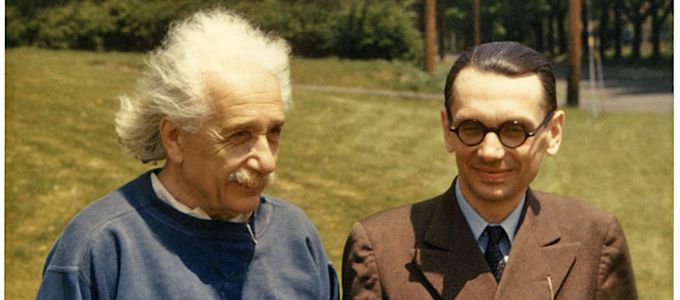
God exists: and a math genius has proven it. And computers have confirmed it. But the calculation doesn’t quite work out—an equation with permanent unknowns on UNESCO’s World Mathematics Day on 14 March.
“This is the end!” — David Hilbert slumped down in his chair. He had wanted to clean up all the math, this jumble of different branches. Then along came a young nerd who showed him the proof: Hilbert’s blueprint would remain forever incomplete. And the professional world was shaken.
This statement is known as the incompleteness theorem. And the name of the shy geek was Kurt Gödel. Later on, people called him the Mozart of Mathematics and the greatest logician since Aristotle—a capacity of such a calibre that even Albert Einstein arranged his quitting time in Princeton in such a way as to be able to accompany his colleague on the walk home.
When “God” turns up in formulas
At the heart of this problem, which occupied him longer than any other, is the statement “G(x)”. His earliest notes date from 1940, and the most recent from February 1970. And G(x), as his handwritten note in the margin explains, stands for “God”.
Not that Gödel was an especially religious person, but he was certainly interested in religion. He read the Bible and knew his way around theology, but certainly did not want his proof of God to be understood as an article of faith. He was more concerned with proving than in the proven.
On faith, love, and hope
So it is that his purely logical flight of fancy leads to an extremely abstract level. Beyond any world of experience, it revolves only around the interplay of three definitions (definitions of terms), five axioms (basic notions) and four theorems (conclusions). The whole thing is formulated in a formula language known as “second order modal predicate logic”, which is not exactly colloquial, even among mathematicians.
What comes out in the end has very little to do with concepts such as faith, love, and hope: a being with the attributes of God must necessarily exist. Gödel never published this theorem, but did not want to take it with him to the grave either. He entrusted his idea to a single colleague, Dana Scott, who presented it in a seminar in Princeton in 1970. His sketches were not officially published until 1987. And it was only 35 years after his death that the final confirmation came.
Computer colleague gives the green light
Artificial Intelligence scientists from the Technical University of Vienna and the Free University of Berlin made sure of that: because Gödel’s evidence was so formalised, it was possible to check it by computer in 2013. And in the end, his number crunching friend gave the green light.
“Why Kurt Gödel’s proof of God is wrong,” the missionaries among the atheists piped up. And all the ghosts who define themselves by negating things stated that the logician had used the rather shaky formula dialect S5.
True enough. However, his “computer buddy” had reduced the whole thing to the secure language variant known as KB. Ever since then, it has been clear to scientists: Gödel’s line of reasoning is watertight.
In the end, a question of faith remains
However, the math genius did not actually provide compelling proof of the existence of God, after all. This was because his series of logical steps begins with assumptions such as: “every property is either positive or negative” and: “a being is divine when it has all positive properties”.
These principles—a total of seven of them—can either be accepted or rejected, and would at least have to be questioned in a variety of ways. Thus the question of the existence of God remains a matter of faith. So the Bible ends up being right, after all, when it states in Hebrews 11: 1: “Now faith is the substance of things hoped for, the evidence of things not seen.”
Beyond this existence
But there is one thing the Mozart of Mathematics has definitely shown, namely “that the thesis of the necessary existence of God can be developed in a way that meets the strictest requirements for scientific justification.” That was how the Frankfurt logician André Fuhrmann put it in one of the most frequently cited works on the subject.
Gödel’s letter of 6 October 1961 to his mother shows us a good deal more: “The world and everything in it has meaning and reason, and a good and indisputable meaning at that. From this it follows directly that our earthly existence—since it has, at most, a very dubious meaning—can only be a means to an end for another existence.”
Photo: Oskar Morgenstern, photographer. From the Shelby White and Leon Levy Archives Center, Institute for Advanced Study, Princeton, NJ, USA.




